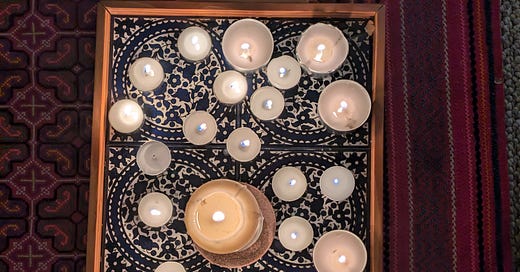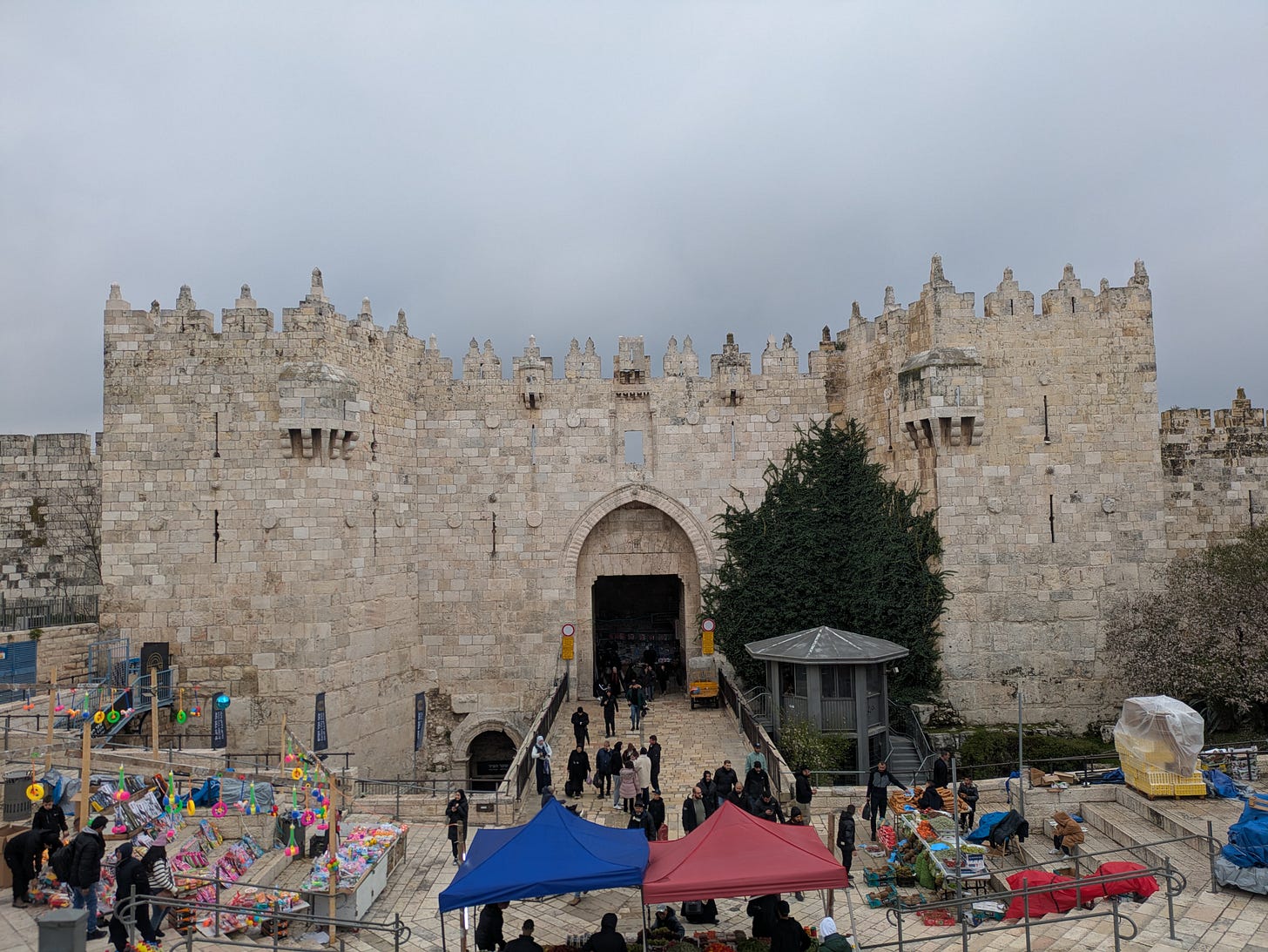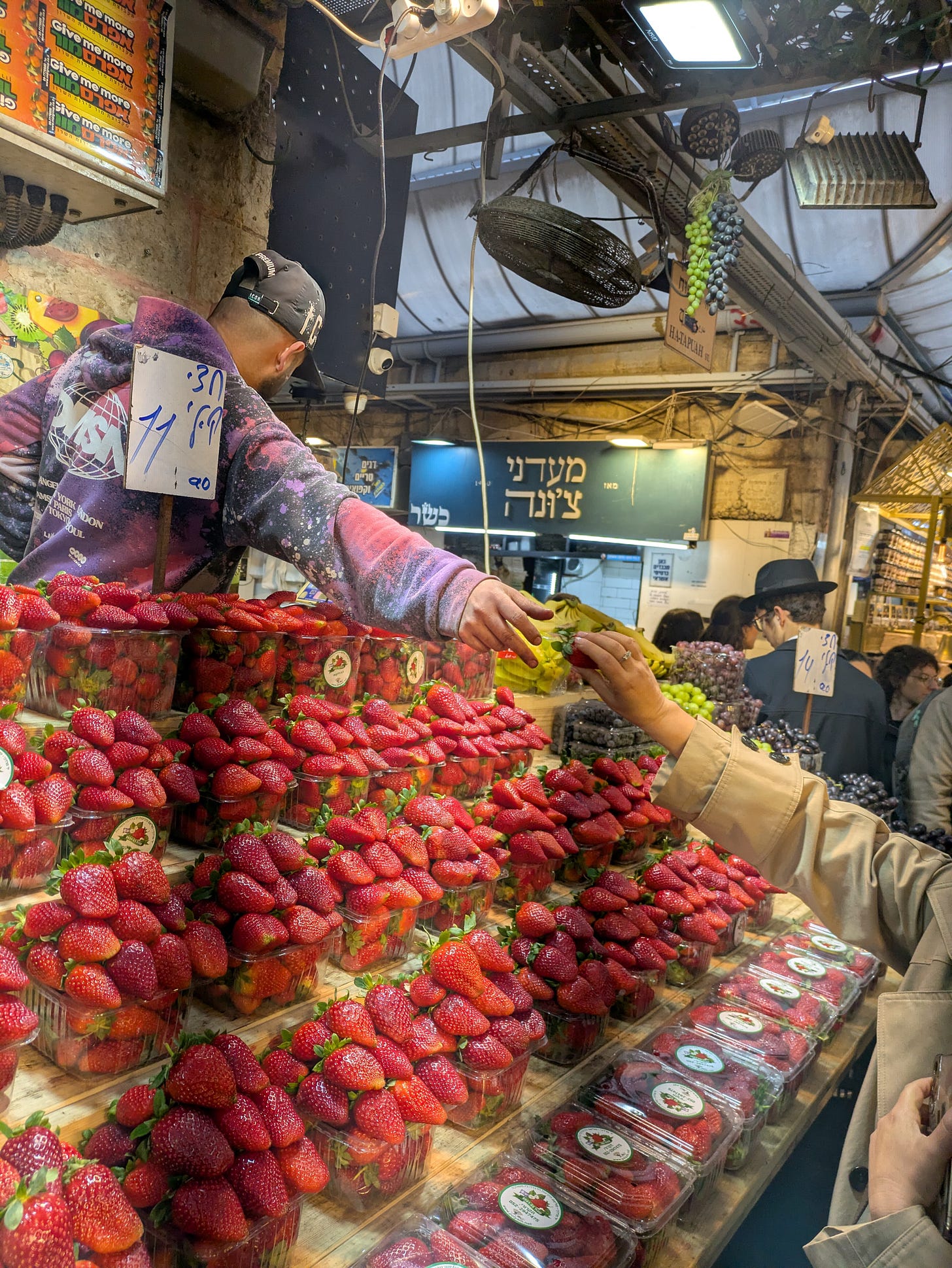Hello friends.
Last week, I posted about joy.
One person commented thus:
“It’s important to have fun during a genocide” - dumb white woman proverb.”
I hated seeing that, because it’s Twitter-type empty snark. Mostly people don’t do that on Substack.
On the other hand, I LOL’d, because at the very moment I saw that comment, I was on my way to an Iftar/Shabbat dinner, in Palestine, with Palestinian, Israeli and international peace activists.
In other words, I spent that evening very intentionally having fun—celebrating, singing, eating, listening, connecting, laughing, crying, hugging—in the (shaky pause, please Gd let be soon the end) of a genocide, with people who have lost family members to that genocide, and with people including myself whose governments have been perpetrating and supporting that genocide.
And yeah, DARREN, it did feel, in its way, important.
I came to Israel this month with a group called Adamah, which is a large and growing North American Jewish climate organization. Over the last year I've become an advisor and supporter of their youth movement.
I've been focusing for a couple of years on the intersection of climate/polycrisis, mental health, and particularly youth well-being. What's drawing me to this group, now, is the potential of what might be called soul force to sustain the transformational change we need on so many levels.
Adamah possesses many assets for building a holistic, soulful movement. They have retreat centers with organic farms. They offer experiential and nature-based education. They have campus and high school chapters and intergenerational programming.
And as Jews we have thousands of years’ worth of spiritual and ethical teachings emphasizing our responsibility to love and care for nature, to limit waste, to save lives as our highest value. We also have beautiful practices to lift our spirits, sustain us and bring us together: practices of blessing, singing, dancing, contemplation and study.
Other religions and spiritual traditions have similar, equally valuable teachings and practices; these are ours.
What Adamah also offers, which is a bit more of a complicated treasure, is community. They have a presence in physical places all over the United States, and a coalition of hundreds of North American Jewish institutions that have committed to some kind of climate action. We spent the week meeting with Israel-based climate organizations, thinking about how we could partner with them, too.
There's been a lot of progressive talk since the election on the importance of community and community building. This work is crucial, especially now when we're experiencing basically a collapse at the level of the national government.
But community is also hard. Community is not your friend group where everyone thinks the same way. It's people who share some important values and/or circumstances, but may have very different beliefs and needs and priorities and motives and ideas about strategies and tactics.
Whoo boy is that ever true of the Jewish community in particular. “Two Jews, three opinions” used to be the joke. Since October 7th it's like “Two Jews, seven opinions, one is that the other one is a baby-murderer-lover.”
Like many, I've been in anguish since October 7th. Not, of course, the same anguish as the people directly affected. Mine is the vicarious trauma of witnessing slaughter, destruction, grief, injustice, repression. And, second, the pain of alienation from some in my Jewish community, and from a few in my leftist/activist community, who are directing their empathy and attention differently than I am in a way that feels painful.
This anguish and alienation is such that I wondered if I could even in good conscience visit Israel.
Ultimately, some wise friends encouraged me to go with my journalist lens on. And I reported an article that I'm excited about. It's on organizations that are pursuing peacebuilding through environmental cooperation, with co-leadership from Jewish Israelis, Palestinians and Jordanians.
To be clear, though I’m choosing to highlight these hopeful efforts, peacebuilding and coexistence are not popular in Israel nor Palestine. These efforts are often called “normalization.”
This work is a candle in the deep, deep darkness. Which is what made my Friday night feel so magical.
It's strawberry season, and the last shoppers in the shuk were striking bargains when I left my Adamah friends in Jerusalem and walked to Damascus Gate, where a Palestinian driver correctly profiled me as heading towards Bethlehem in the West Bank. One checkpoint was closed; on the second we were waved through. He dropped me off in the middle of a tilted street, as the hills of Jerusalem turned smoke blue. A German meditation teacher named Frank met me and walked me to the peace house called Satyam, which was holding their one-year anniversary celebration.
Satyam emerges from a community of people who have been building deep relationships for over a decade, some at a previous project near Jericho. These include Palestinian activist Mai Shaheen, who was away when I visited but whom everyone seemed to revere, and another, Niveen Khalil, who was acting as house mother. Other key people I met are from Israel, Germany, Italy and Switzerland.
There are two narrow white houses connected by a roof that’s in the process of becoming a garden. Both kitchens were bustling when I arrived, and I got to slicing tomatoes. Others were burning incense, doing yoga, and tidying the dorm-style bedrooms; almost 20 people would be spending the night.
Satyam teaches meditation and nonviolent communication, but the primary functions, as I briefly experienced them, were relationship-building and community care.
Without going into detail, I saw and heard that it's not completely safe or easy for any of these people to be here, doing this, right now. Yet the vibe was familiar to me from Occupy and Burning Man: a temporary utopia.
After the Ramadan fasters got their dates and juice, dinner was a gorgeous vegan spread of maqluba, salads, hummus, halvah, and those beautiful strawberries. A few of us lit Shabbat candles. It was a cold night, and we all gathered on cushions in a cozy room with a space heater, where a curly-haired young man played the oud and sang in Arabic and Hebrew. His voice hushed the room; velvety, with a hint of vibrato. The lyrics translated to: “Swim deep in the ocean of your heart, to find the pearl of truth.”
Truth. Satyam is Sanskrit for “Truly” or “for the benefit of truth”.
A few people, like me, were there for the first time. One, a young Palestinian man, asked simply: “What's this all about? What's the purpose?”
With speakers and translators switching between English and Arabic, the explanation came:
The requirement for being here is that you believe in justice, safety, dignity, freedom for all people, and an end to the occupation.
The practice of being here is that you listen deeply, without just waiting for your turn to speak. That you speak your truth, with regard for who is listening.
And the experience of being here, as I experienced it, and as multiple people expressed it to me, is warmth; relief; care; safety; dare I say, love.
I sat in small group discussion with a Palestinian member of Combatants for Peace, a group that's been nominated for a Nobel Peace Prize; a younger Palestinian peace activist and environmental engineer; and two Israeli peace activists, one a mom who had driven from Tel Aviv.
There was some friction. It wouldn't be the truth if it didn't lead to a little discomfort.
But what we each expressed having in common is that some of our family and friends thought we were nuts to come to a space like this, to hold space for a conversation like this.
Not just nuts. Naive, counterproductive, untrustworthy, maybe even evil.
And what we also each expressed is deep gratitude for the opportunity to be with people who are seeking to understand each other when there is so much pain and division.
For me, it was the inverse of what I've been feeling in some Jewish spaces; and with some people close to me. Instead of the alienation — I thought we were united, but we see things so differently— it was a sense of recognition— I thought you might hate me, but instead we both are people who crave safety and peace and good fresh halvah.
I'm in the air now, flying back from one fucked-up country to another. A country that is currently weaponizing anti-Semitism and trampling on the First Amendment to disappear a legal resident who has protested for Palestine.
I know this week is going to stay with me a long time, for many reasons.
First lesson: to not abandon truth in the pursuit of peace, nor (and this one is my personal growth edge) to abandon peacefulness in the pursuit of truth.
Second lesson: that community and humble relationship building, the messy and, yes, joyful kind, are necessary if not sufficient conditions for peace, justice and healing the earth.
Ramadan Mubarak to those who celebrate. If you want to support Satyam or learn more, you can go to www.satyamhome.org.
More good things
Climate Mental Health Network’s Gen Z-ers have put out an awesome “zine” for youth about climate emotions and wellness. You can download it here, and watch this short video by Laurel Tamayo, who I interviewed last year.
In addition, check out the launch webinar on 3/25 for Climate Mental Health Network’s teacher intervention! This is the first evidence-based, teacher tested classroom intervention for climate emotions.
Details are here: https://www.climatementalhealth.net/intervention-webinar










I worked for Adamah from 2004-2009 (back then it was called Hazon), and can attest that they, as an organization, have always been led by nuance and compassion--whether with humans' relationship to the planet or our complicated relationships to one another. I'm so glad to hear that they are still doing good work. That sounds like a truly special iftar. I am looking forward to your article!
On a pettier level, fuck the trolls. Thank you for being committed to the tough work of building new worlds, rather than the foolish and all-too-easy work of tearing other people down.
Anya, what is this concept of normalization, exactly? I first heard about it after the Palestinian documentary won an Oscar. It's crazy to me that even peace building is controversial.
Thank you for this post and your bravery for going to Palestine and speaking about it. I have always been active in peace and social justice movements but it's gotten very complicated lately. My husband is Jewish and some of his relatives have lived in Israel and very much believe whatever the Israeli govt/IDF says. My husband is more moderate but still he had no knowledge even of the Nakba and we've had some very tense conversations. I appreciate all people standing up for peace and human rights and especially Jewish people standing up for Palestinian rights. ❤️